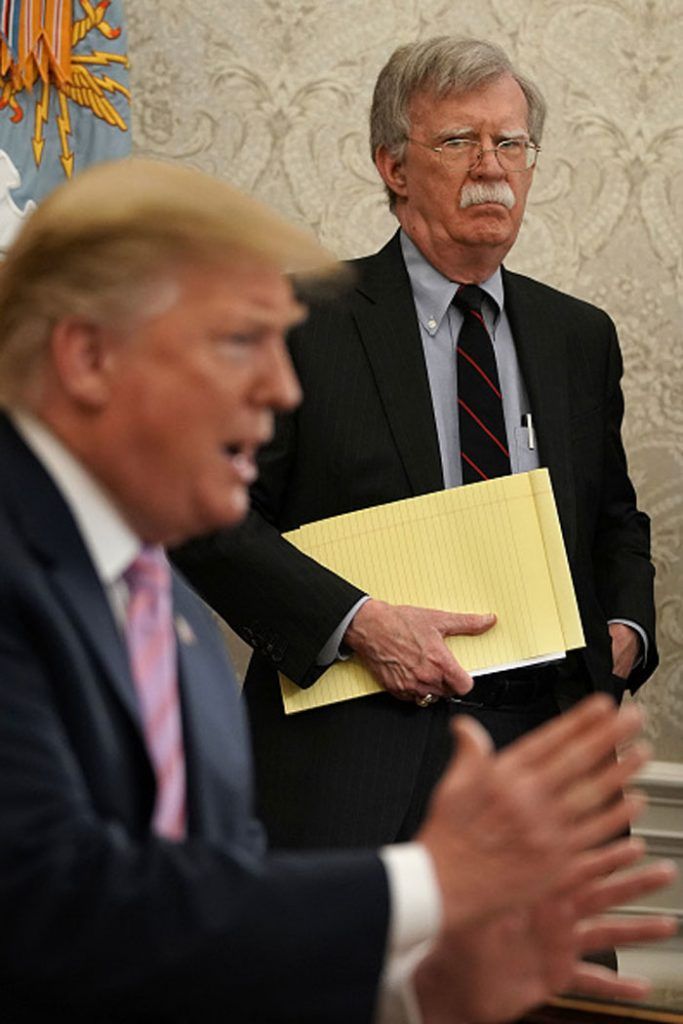War and Peace: Bolton and Trump tell a confused story about possible military action against Iran
By John Mecklin | May 16, 2019
 National Security Adviser John Bolton standing behind President Trump in April. Photo credit: Getty Images
National Security Adviser John Bolton standing behind President Trump in April. Photo credit: Getty Images
The New York Times reported earlier in the week that top Trump administration national security officials asked for and received a briefing on military plans that would send some 120,000 US troops to the Middle East should Iran take aggressive actions against American forces there or resume work on nuclear weapons. That article set off furious tweetstorms from national security policy experts suggesting that National Security Adviser John Bolton was once again (see: Operation Iraqi Freedom, 2003) steering the United States into war in the Middle East on false pretenses.
There is no legal authority to use military force against Iran. US officials have been clear they want depose the Iranian regime. Anything they say should be suspect and not taken at face value.
— ?? Jon B. “Globalist” Wolfsthal (@JBWolfsthal) May 14, 2019
I oversaw Iran policy and planning at the Pentagon from 2009-2011, at the height of concerns over Iran’s nuclear progress, and no plausible contingency except invasion and regime change would require sending 120,000 US forces to the Middle East. https://t.co/tBbpEVzddM
— Colin Kahl (@ColinKahl) May 14, 2019
President Trump denied the Times report the next day, in a way that, as has often been the case, made a foreign affairs situation more rather than less confused: “I think it’s fake news, OK? Now, would I do that? Absolutely. But we have not planned for that. Hopefully we’re not going to have to plan for that. And if we did that, we’d send a hell of a lot more troops than that,” Reuters quoted Trump as saying.
The confusion continued as the Trump administration repeated claims that it had sent a carrier task force and other military assets to the region to counter unspecified threats to American troops and facilities in the region. These claims were subsequently downplayed by British Maj. Gen. Chris Ghika, the deputy commander of the American-led coalition fighting the Islamic State, who, according to the Times, said: “No, there has been no increased threat from Iranian-backed forces in Iraq or Syria.”
The US Central Command responded almost immediately by saying Ghika’s comments run “counter to the identified credible threats available to intelligence from U.S. and allies regarding Iranian-backed forces in the region.”
The Washington Post reported Wednesday that “three distinct Iranian actions have triggered alarms: information suggesting an Iranian threat against US diplomatic facilities in the Iraqi cities of Baghdad and Irbil; US concerns that Iran may be preparing to mount rocket or missile launchers on small ships in the Persian Gulf; and a directive from Khamenei to the Islamic Revolutionary Guard Corps and regular Iranian military units that some US officials have interpreted as a potential threat to US military and diplomatic personnel.” But in a stunning addition to a week of speculation about war with Iran, the Post article was headlined “Trump, frustrated by advisers, is not convinced the time is right to attack Iran” and quoted a senior unnamed administration official to the effect that Trump is frustrated with Bolton’s martial approach. The president, the official said, “wants to talk to the Iranians; he wants a deal,” not war.
Of course, some social media observers noted an obvious implication of the Post headline—there is a right time to attack Iran, it’s just not now. And others demanded what they see as another obvious implication of the situation: Bolton needs firing.
Fire John Bolton then: Trump, frustrated by advisers, is not convinced the time is right to attack Iran https://t.co/BG8E8E9MRm
— Ankit Panda (@nktpnd) May 16, 2019
In general, while reporting the chaotic and shifting signals about the possibility of war with Iran—a possibility that seemed to spring from nowhere this week, supported only by vague assertions of Iranian threats—the major news media have not done a particularly good job of explaining why major US military action in Iran would be, in practical terms, so likely to end in disaster. David Frum takes a stab at such explication in a piece for The Atlantic, but his blade largely misses the target, with Frum, a former speechwriter for former President George W. Bush, spending most of the article explaining and apologizing for his support of the Iraq War of 2003.
For those interested in understanding why the probability of a successful US military effort against Iran is so horribly low, I recommend a reading (or re-reading) of this 2004 article by Atlantic correspondent James Fallows. Though not the most scintillating prose Fallows has ever written (sorry, Jim), the article lays out clearly and completely what a fool’s errand a US attack on Iran—a country that has been girding itself to thwart a US invasion for decades—would quickly become. The article details a carefully conducted war game of options in regard to Iran, played out by top experts. A concluding quote from the article says much about the options available to a US president, then—and now. “After all this effort, I am left with two simple sentences for policymakers,” retired Air Force Col. Sam Gardiner said of the exercise. “You have no military solution for the issues of Iran. And you have to make diplomacy work.”
Publication Name: The Atlantic
To read what we're reading, click here
Together, we make the world safer.
The Bulletin elevates expert voices above the noise. But as an independent nonprofit organization, our operations depend on the support of readers like you. Help us continue to deliver quality journalism that holds leaders accountable. Your support of our work at any level is important. In return, we promise our coverage will be understandable, influential, vigilant, solution-oriented, and fair-minded. Together we can make a difference.
Topics: Nuclear Weapons, What We’re Reading















